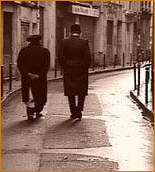
"I Need a Rebbe Who
Will
|
 |
The encounter between the Hasidic Rebbe and his disciple took the form of a private one-to-one Spiritual meeting or encounter known as a “yehidur”. The Rebbe was given permission and encouraged to serve the disciple very strongly. Many “methods of awakening” were used, including “shock”:
Hasidic rebbes believed that gradual methods were sometimes inadequate to help the hasid see his condition in all its complexity. . . . [T]he rebbe’s task was to overcome the hasid’s elaborate defenses and make him face the truth about himself, however unpleasant. . . . To accomplish this goal, the rebbe often employed shock to rouse the hasid into a markedly more lucid view of his predicament.
A Rebbe would deliberately tell things to the disciple to shake him loose from conventional viewpoints. The confrontation is often described as a battle between the Rebbe and the disciple’s ego:
The Rabbi ‘fought’ . . . to shock the Hasidic Jew into a realistic self-appraisal. . . . A hasid could also not count on a rebbe’s conventional morality.
It is related that the extent to which shock was used in the yehidur depended on the Rebbe’s personal style, as well as his orientation and training:
Those of the Kotzk school employed shock more than their Chabad or Ruzhiner counterparts. Indeed, Kotzk Hasidism viewed shock as a vital part of their treatment for inner difficulties. “I need a rebbe who will flay the living skin from my flesh, not one who will flatter me!” declared Rabbi Isaac Meir of Ger.
Another technique is known as “restructuring”, in which the entire social situation or life of a hasid was changed by the Rebbe, so that the disciple would see what he had been doing. So, for example, a very stingy man came to the Maggid of Mezritch for his Blessing. He bragged that despite his money, he continued to eat only the simplest foods.
Thereupon, the Maggid advised him to begin immediately to eat the richest and most expensive foods. The Hasidim who heard this could not understand it.
The Maggid explained, “When this man starts to consume and enjoy lavish dishes, he will see how stingy he has been. Thereby, he will understand the plight of the poor who have only bread and salt. But so long as he limits himself to eat only bread and salt, he will think that the poor can subsist on rocks.”
 Birth, Life & Death
Birth, Life & Death

186,104 people have liked our site's pages and shared them with their Facebook friends - Most Shared Pages
© 2025 Copyrighted materials used with the permission of The Avataric Samrajya of Adidam Pty Ltd, as trustee for The Avataric Samrajya of Adidam. All rights reserved. None of these materials may be disseminated or otherwise used for any non-personal purpose without the prior agreement of the copyright owner. ADIDAM is a trademark of The Avataric Samrajya of Adidam Pty Ltd, as Trustee for the Avataric Samrajya of Adidam.
Technical problems with our site? Let our webmaster know.